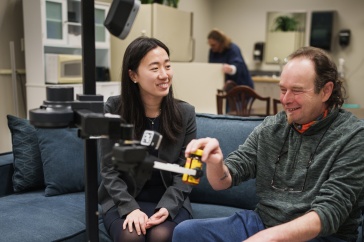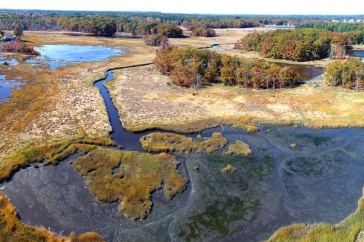|
|
Outdoor education professor Mike Gass in front of the climbing wall in New Hampshire Hall (Photo: Mike Ross)
Mike Gass almost never made it to UNH.
In the spring of 1981, shortly after Gass was hired to teach the University’s first rock climbing class the then-dean of the College of Health and Human Services determined the department wouldn’t have the funds for his position.
When he set about to revoke the job offer, however, the dean discovered Gass was unreachable.
|
|
“This was well before the days of email and cell phones, and figuring since I was all set for the fall I’d gone to Alaska to teach climbing on Mount McKinley,” Gass recalls with a laugh. “When the dean heard where I was and what I was up to, he decided he had the money after all.”
The Browne Center for Innovative Learning at UNH
Today, UNH is one of the best-regarded outdoor education departments in the world, with one undergraduate major and two graduate degrees that prepare students to teach, administer and lead outdoor programs, and deliver various types of programming through outdoor experiences. A leader in adventure-based therapy and outdoor experiential education and home to the world-renowned Browne Center for Innovative Learning, it’s hard to imagine UNH without outdoor education—or Gass.
Challenging the Young Lecturer
It was the Browne Center’s namesake, late physical education professor Evelyn Browne, who first advocated for an outdoor education curriculum at UNH. An innovator who came to UNH in the 1940s to teach riflery and horseback riding, Browne readily grasped the connection between physical challenges and learning opportunities and saw vast, untapped potential in the University’s seacoast location.
Taking her retirement the year before Gass was hired, Browne challenged the young lecturer to build a program from the ground up. His first semester, in addition to the rock climbing class, Gass taught aerobics and conditioning in the basement of the Field House to earn his keep, then slowly expanded the curriculum to include courses in winter mountaineering and wilderness navigation as well as a theory class in the philosophies and methods of outdoor education.
Pam McPhee became the program’s first graduate in 1983—a year before it became an official option in kinesiology. McPhee, who had very nearly left UNH in 1981 after spending a semester as an instructor at the National Outdoor Leadership School (NOLS), says it was a case of lucky timing. “I returned to UNH from NOLS wondering if there was really anything for me here, and lo and behold, here was Mike.” McPhee took Gass’ rock climbing class, and all his others, and soon was a teaching assistant in several of the department’s courses herself while completing a “self-designed” degree in outdoor education.
At the Front of the Wave
Pam McPhee '83 is the outdoor education program's first graduate and now teaches at UNH. (Photo: Lisa Nugent)
McPhee and Gass found themselves at the front of a wave of interest in the subject matter. At the time, some 20 years after Outward Bound was introduced to the United States, outdoor education programs were in a significant growth phase nationally, and demand at UNH only increased after the program was formalized in 1984.
Three decades later, the program comprises an undergrad degree, two masters programs (one a dual-degree program with the department of social work), and a doctoral program administered jointly by CHHS and the department of education in the College of Liberal Arts, enrolling some 120 students at any given time. UNH outdoor ed graduates can be found quite literally around the globe, in places as far away as Singapore and Budapest, involved in every aspect of a broad array of outdoor education-related disciplines.
“It used to be that no one came to UNH for the express purpose of studying outdoor education,” says Gass. “It was something they discovered once they got here and came across a course. In the past 10 or 15 years, however, that dynamic has really changed.”
For all the far-flung doors a UNH outdoor education degree opens, a number of graduates have chosen to reinvest their talents on campus.
Brent Bell ’89, who earned the University’s first PhD in experiential outdoor education in 2005, is a UNH associate professor of kinesiology. So is Jayson Seaman ‘06G, who was awarded the program’s third doctorate a year after Bell. And McPhee, whose “self-designed” major in outdoor ed brought her back to UNH to teach between two adventure programs in Maine and Alaska and while earning a master’s degree in social work from the University of Connecticut, has been a full-time clinical faculty member since 1987. Since its inception in 1994 she’s also served as executive director of The Browne Center, a job she describes as a “joy” and “inspiring.”
“When it comes to outdoor education classes, students immediately grasp that what they are learning is going to matter to more than just themselves,” McPhee explains. “The skills they’re learning are going to make a difference—maybe to a troubled teenager, maybe to someone whose outdoor experience is going to change the way they see the world. It’s about so much more than just earning a grade.”
Gass and McPhee both marvel at how far UNH outdoor ed has come since Gass’ first rock climbing course. Today the faculty roster is replete with acclaimed specialists who are the program’s biggest draws, including Bell, whose interest in wilderness pre-orientation trips for new college students has been at the forefront of a national trend, and Laurie Gullion, a leading authority on whitewater canoeing expeditions and women’s wilderness travel.
One of Gass’ specialties is adventure therapy programming, which provides interventions for at-risk and vulnerable youth through novel physical experiences. Earlier this year, he lead-authored his third textbook on the subject, which he sees as being one of the central focuses of the future of outdoor ed.
Explaining the success of adventure programs, Gass notes, “It’s hard to be apathetic when your mind and body are at work in the outdoors.”
That sentiment also might just sum up his personal feelings about outdoor education—and capture the discipline’s ever-increasing popularity at UNH and beyond.
Originally published by:
The College of Health and Human Services
-
Written By:
Kristin Waterfield Duisberg | Communications and Public Affairs
















































